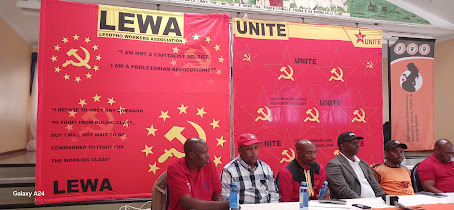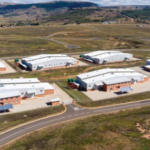Lesotho’s textile and garment industry workers are preparing to take to the streets in a last-ditch effort to protect thousands of jobs threatened by global trade uncertainty.
A coalition of trade unions yesterday announced plans to petition both the Government of Lesotho and the United States to renew the African Growth and Opportunity Act (AGOA) and reverse new U.S. tariffs on Lesotho’s textile exports.
The unions, Independent Democratic Union of Lesotho (IDUL), United Textile Employees (UNITE), Lesotho Workers Association (LEWA), National Clothing, Textile and Allied Workers Union (NACTWU), and the Construction, Mining, Quarrying and Allied Workers (CMQ), said urgent action is needed as AGOA’s expiration date looms.
The current trade concession is set to end in September 2025, and with no certainty about its renewal, factories are already scaling back operations.
Addressing journalist at a press briefing, the unions described AGOA as “the backbone of Lesotho’s textile exports and job creation.” They warned that the uncertainty has already led to reduced export orders and some factory closures.
“We call on the Government of Lesotho and U.S. legislators to urgently secure an extension of AGOA under fair and inclusive terms,” the unions said.
“The extension is vital for economic growth, job creation, and preventing job losses for Basotho. Without it, the country faces economic instability and a potential collapse of its key export industry. Our workers must not be collateral damage in global trade negotiations.”
The textile industry remains Lesotho’s largest private sector employer. Trade and Industry Minister Mokhethi Shelile warned in April of “disastrous consequences” if AGOA lapses. According to his ministry, 11 factories currently serve the U.S. market, employing more than 12,000 Basotho workers, most of them women.
Alongside the uncertainty over AGOA, the unions are also protesting against the imposition of new U.S. tariffs on Lesotho’s exports. Goods entering the U.S. from Lesotho are now subject to duties of up to 15 percent, a policy the unions say is already devastating factories.
“The imposition of punitive U.S. tariffs, up to 15%, has devastated our textile sector, leading to mass layoffs and factory shutdowns. These tariffs disproportionately harm women and youth particularly in the textile industry, who make up the majority of the garment workforce.
“This leads to widespread economic hardship, reduced local spending, and necessitates drastic government action to mitigate the effects of job losses and provide support for affected communities.”
They added that families dependent on low-wage factory jobs are struggling to afford basic needs such as rent and food.
The Private Sector Foundation of Lesotho (PSFL) echoed these concerns in July, warning that U.S. tariffs, originally proposed at 50 percent but now implemented at 15 percent, could reduce Lesotho’s export orders by as much as 30 percent.
Minister Shelile has also recently expressed frustration, noting that continued trade with the U.S. is becoming unsustainable under the current tariff regime, adding that the government has made repeated efforts to negotiate tariff relief with U.S. authorities.
In addition to trade issues, the unions plan to raise concerns about violations of workers’ rights in the textile sector. They highlighted the case of Quantum Apparel, accusing the company of intimidating employees, imposing lockouts, and denying them the right to freely associate.
“Workers at Quantum Apparel have faced intimidation, lockouts, and denial of their right to freely associate and organise. This company is violating a fundamental right guaranteed by the constitution and international agreements.
“Without freedom of association, workers are unable to form collective bodies to advocate for better wages, working conditions, and other rights, leaving them vulnerable to exploitation.”
The unions are calling for the immediate reinstatement of affected workers, recognition of union representation, and strict enforcement of labor laws.
“We will not be silent while our people suffer. We call on government, industry, and international partners to act now. Decent work is not a privilege, it is a right.”
Although they are yet to secure a permit authorising the march from Lesotho Mounted Police Service, the unions plan to stage it on September 17 this year.
Summary
- Lesotho’s textile and garment industry workers are preparing to take to the streets in a last-ditch effort to protect thousands of jobs threatened by global trade uncertainty.
- A coalition of trade unions yesterday announced plans to petition both the Government of Lesotho and the United States to renew the African Growth and Opportunity Act (AGOA) and reverse new U.
- Independent Democratic Union of Lesotho (IDUL), United Textile Employees (UNITE), Lesotho Workers Association (LEWA), National Clothing, Textile and Allied Workers Union (NACTWU), and the Construction, Mining, Quarrying and Allied Workers (CMQ), said urgent action is needed as AGOA’s expiration date looms.







